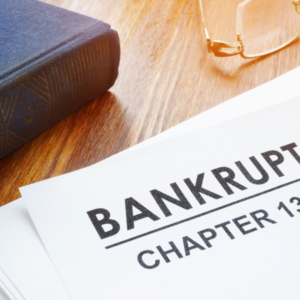Is Chapter 13 Bankruptcy for Individuals or for Businesses?

Filing for bankruptcy can provide relief for individuals and businesses experiencing overwhelming financial challenges. However, only some types of bankruptcy are available to both, and the confusing naming convention can make it hard to know which ones could apply to your specific situation. Understanding the differences, benefits, and alternatives can help you make the right choice for your financial future.
Chapter 13 Bankruptcy Is Limited to Individuals
So, who can declare Chapter 13 bankruptcy? Chapter 13, Title 11 of the United States Code has the title “Adjustment of Debts of an Individual with Regular Income.” The title tells us two things.
The first is that Chapter 13 bankruptcy is available only to individuals. As such, companies will need to look into other options.
The second is that the individual who files must have a regular income. For this reason, you may hear some people refer to Chapter 13 as a “wage earner’s plan.”
How Does Chapter 13 Work?
Under Chapter 13, an individual proposes a repayment plan to satisfy their debts to their creditors. This plan will discharge some of these outstanding debts and allow the filer to make payments they can afford for the remainder of them. The repayment plan lasts for three years for people whose income is below the median and for five years for those whose income exceeds the state minimum. In no case can a Chapter 13 repayment agreement last longer than five years. During this time, pre-petition creditors are generally not permitted to start or continue debt collection efforts.
Benefits of Chapter 13 Bankruptcy
Chapter 13 bankruptcy offers several advantages, including the following:
- You get to keep your property. Unlike Chapter 7 bankruptcy, where your non-exempt property can be liquidated to pay your debts, Chapter 13 allows you to keep personal property like your home, car, and other belongings.
- It stops foreclosures and repossessions, helping you catch up on mortgage and car payments.
- Credit card and medical debts can be discharged.
- It gives you time to improve your financial situation.
What Type of Bankruptcy is Best for a Business?
The following types of bankruptcy are available for businesses:
- Chapter 7 bankruptcy liquidates the business’s assets to pay off its creditors. The business must cease operations and close. Owners are not personally responsible for business debts.
- Chapter 11 bankruptcy allows the business to continue operating while a repayment plan is put into effect. An owner can restructure debts to make repayment more manageable, and they typically remain in control unless the court appoints a trustee.
Chapter 11 can be preferable for larger businesses wanting to reorganize and stay open. However, the legal fees and related costs are higher. Chapter 7 is generally better for smaller businesses that need a clean break so the owner can move on. Discussing your business’s situation with a bankruptcy attorney can help determine your best option.
Contact Our North Carolina Bankruptcy Lawyers Today
If you have a regular income through wages/salary or self-employment, you can file for Chapter 13 bankruptcy to ease some of your financial burdens. The inability to adhere to the plan could void its protections. Working with a legal professional may make the process more efficient and effective.
The Chapter 13 bankruptcy lawyers at Sasser Law Firm can assess your situation and help you take steps toward financial freedom. Our three board-certified bankruptcy specialist attorneys have over 20 years of experience to put at your disposal, so call us today or contact us online for a free consultation.
This post was originally published in February 2021 and has been updated for accuracy and comprehensiveness in October 2023.
- About the Author
- Latest Posts
For more than 20 years, the Sasser Law Firm has been helping individuals and business owners sort through financial hardships to see the light at the end of the tunnel. Our North Carolina bankruptcy attorneys are all board-certified specialists, which means we have passed a complex exam, undergone a thorough peer review, and continue to earn legal education credits in this ever-evolving area of law.














